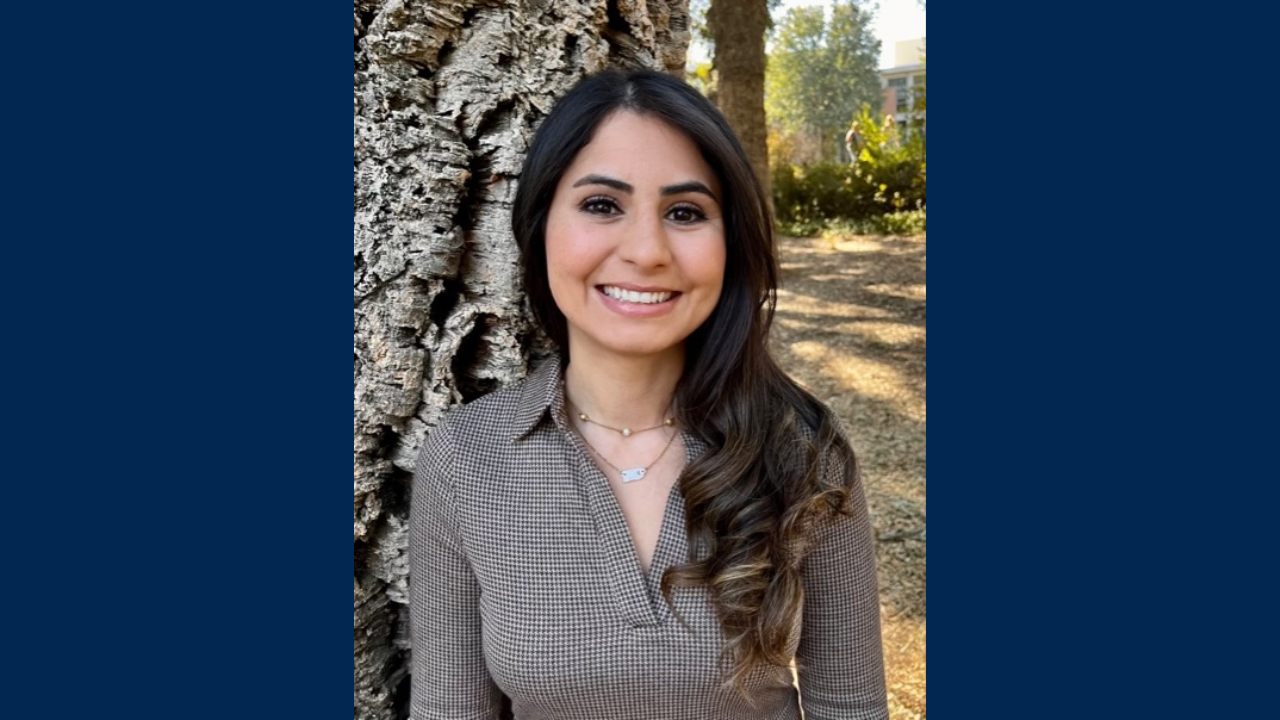
Alternative Energies, Mentorship and Building Community at UC Davis
The spark for science was always within Jessica Ortiz-Rodríguez. As a child growing up in Puerto Rico, she loved visiting the Discovery Channel Store. And when the holidays rolled around, Ortiz-Rodríguez’s parents always knew there’d be something there that they could gift their daughter. Telescopes, microscopes, chemistry sets, the list went on and on.
But as Ortiz-Rodríguez aged, her interest in science became specialized. Subjects like biology and anatomy hinged too much on memorization for Ortiz-Rodríguez. But chemistry felt concrete. Quite literally it was the study of matter. And that foundational nature resonated with Ortiz-Rodríguez.
“With chemistry, it felt like you could always get to the beginning of something and build from there,” said Ortiz-Rodríguez, who is a fourth-year doctoral candidate in the UC Davis Department of Chemistry.
As a member of the Velázquez Lab, run by Assistant Professor Jesús Velázquez, Ortiz-Rodríguez uses electrochemistry to explore alternative energy technologies. Her research focuses on the synthesis and characterization of chemical compounds called molybdenum chalcogenides and their efficacy as electrocatalysts for energy conversion reactions. The research could help create alternative methods for storing energy that work in tandem with renewable energy resources, like wind and solar.
“The increase in energy demand has brought the challenge of developing efficient energy conversion technologies without further impact on the environment,” said Ortiz-Rodríguez, who is also a member of the National Science Foundation’s Graduate Research Fellowship Program (GRFP). “Electrochemical reduction of carbon dioxide to commodity chemicals and liquid fuels is an emerging alternative energy technology that could potentially create a carbon-neutral energy cycle, increase fuel sources and serve as a convenient way to store renewable electricity sources, such as wind and solar in high-energy density chemical bonds.”
Due to her innovative research, Ortiz-Rodríguez was awarded the National Academies of Sciences, Engineering, and Materials’ Ford Foundation Dissertation Fellowship.
“What I have been trying to build towards in my Ph.D. are basically design principles that can assist in the development of selective and efficient electrocatalyst,” said Ortiz-Rodríguez.
“Realistically, I’m here for five years and in those five years, I’m only putting a grain of salt into the bigger picture. So if my grain of salt is giving guidelines that can facilitate material discovery, that can make a huge impact.”
The impact of mentors
Ortiz-Rodríguez’s foundational work in electrochemistry started back in 2017, when she was an undergraduate student at the University of Puerto Rico at Cayey. At the time, Ortiz-Rodríguez was in the midst of applying to summer research programs, and she’d identified UC Berkeley as a top pick.
“But as I was applying to Berkeley, we got a visitor from UC Davis,” said Ortiz-Rodríguez.
The visitor was none other than Velázquez, who was presenting his research at his alma mater. After Velázquez’s talk, Ortiz-Rodríguez approached him, hoping to pick his brain about his experiences in California.
“I started to tell him a little about my background, what I’ve been doing, where I want to go, and he was like, ‘You should be on my team. You should definitely be on my team.’”
“For me, it was so powerful that someone with my same background was actively recruiting me,” she added. “I knew he was going to go above and beyond for me.”
That following summer, Ortiz-Rodríguez took Velázquez up on his offer. She spent the season at UC Davis, working as an undergraduate research assistant in Velázquez’s lab. She researched the potential of using conventional microwaves to synthesize Chevrel phase materials. With Velázquez’s permission, Ortiz-Rodríguez ordered a Panasonic microwave online and started testing its efficacy.
“We were actually able to synthesize the materials that we wanted using a Panasonic microwave, which was amazing,” she said. “We were able to synthesize the materials in 10 minutes.”
The experience convinced Ortiz-Rodríguez to pursue this research thread and apply to UC Davis. But as she was applying to both UC Davis and the GRFP, Hurricane Maria struck Puerto Rico, leaving Ortiz-Rodríguez without electricity for three months.
“I traveled around the island looking for electricity and internet connection to complete my applications,” said Ortiz-Rodríguez. “Jesús did everything in his power from California to find deadline extensions for me so I could still apply to graduate school during the year.”
Building a community
Since joining the UC Davis community, Ortiz-Rodríguez has continuously shown not just a passion for research but also a passion for community-building. During the height of the coronavirus pandemic, she assisted in the design and implementation of an introductory chemistry course tailored to provide academic and social support to underrepresented minority students.
“We recognized that students who have been historically excluded from STEM could face more challenges for academic success during COVID,” said Ortiz-Rodríguez, who notes she’d like to continue mentoring students following her doctorate. “We created a program where we recognize that it’s not enough to just give academic support to these students. We also have to promote some kind of social support so they can have a community.”
For Ortiz-Rodríguez, it all links back to her experiences as an underrepresented minority in the sciences. She wants to share her learnings with other underrepresented minority students and create a space where they feel at home.
And according to Ortiz-Rodríguez, integral to her success were caring mentors like Velázquez.
“Always surround yourself with people that push you,” she said when asked for her advice to future graduate students. “I think that makes a lot of difference in the world.”
— Greg Watry, freelance writer for the UC Davis College of Letters and Science
